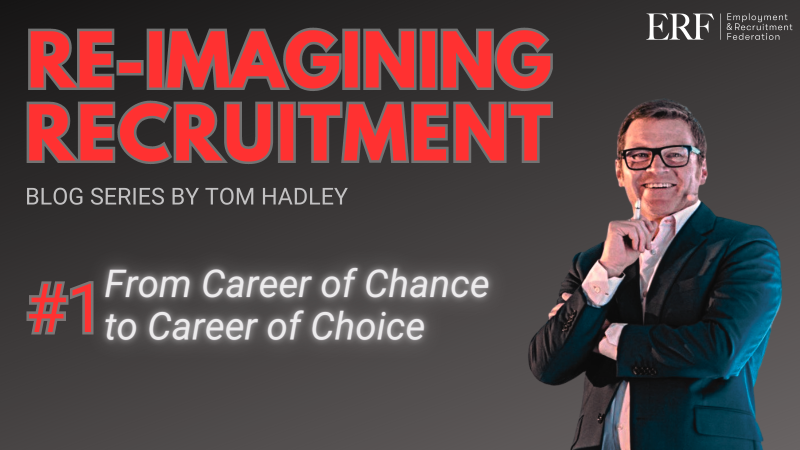

[post_title]
Published: [post_published][the_excerpt]
[post_title]

Re-imagining Recruitment
#1 - From career of chance to career of choice
Building on discussions at the ERF’s TalentCon events in Dublin and Cork, Tom Hadley takes stock of the changing role and remit of the recruitment profession
“When I grow up, I want to be a recruitment professional”, said not many young people, ever!
Until now.
Over recent months, the ERF has convened industry leaders from all over Ireland (and further afield) to tub-thumping TalentCon events in Dublin and Cork. And the underlying, totemic takeaway message is as follows: There has never been a more exciting time to be part of a profession that has the power to change people’s lives for the better.
What external factors are driving this and what does the role and remit of a 21st century recruitment and employment professional look like? Below are a few thoughts, based on the TalentCon conversations and global manifestations of this perceptions step-change.
The winds of workforce change are blowing a gale!
Speaking at the Dublin event, leading economist, author and podcaster Jim Power underlined the rampant strength of Irish labour market and record employment. But this has created a major challenge for employers; finding the staff and skills they need. Addressing mismatches through education and skills policy and through effective reskilling initiatives is part of the solution. But, what are the short-term outlets for business leaders? According to Brendan McGinty Managing Director of Stratis Consulting Ltd: “Good recruitment is a source of competitive advantage, but employers need help and are looking for external support in areas such as internal skills audits, diversity and employer brand”. The sheer variety and scale of current workforce challenges is shinning a light on the vital role of HR and recruitment professionals; it is also one of the factors driving a broader role and remit.
Workforce issues have made their way to the top of the ‘worry list’ for business leaders across Ireland. But a volatile economic landscape mitigates against long-term staffing plans. Within this context, recruitment professionals are stepping up to facilitate the crucial outlet that temporary and contract workers can provide. Bettina Schaller, President of the World Employment Confederation framed this contribution as follows: “As the war for talent intensifies, employment and HR services providers play the role of peacekeepers, providing stability in a time of massive instability”.
In addition to economic volatility, there are many other external factors at play: The expectations and needs of workers are constantly evolving, technology is changing the very nature of many jobs and new working patterns have become the new norm. Navigating a shape-shifting world of work is an arduous task. Arduous but fascinating. Which brings us back to why working in the front line of the labour market, as an employment and recruitment professional, is an increasingly enticing prospect.
Recruitment as a profession of choice? Yes, really!
The TalentCon events in Dublin and Cork were like old-school ‘happenings’ and were the embodiment of the status sea-change. What’s going on? One big attraction is the opportunity to innovate, to enhance workforce strategies and to make positive change happen. This was encapsulated by Donal O'Donoghue, ERF President and MD of Sanderson: “Recruiters are at the forefront of developing and implementing increasingly innovative hiring solutions; we are labour market enablers”. This theme was picked up in Cork by LinkedIn’s Caitriona Lannen O’Brien who underlined the fact that recruitment professionals are not just enablers, they are ‘connectors’. They are also champions of ‘human-centricity’ at a time of tech-driven omnipotence.
According to James Osborne, CEO of The Recruitment Network: “The work of recruitment professionals is moving from transactional to transformative”. We are entering the era of the talent strategist, and this ‘recognition ramp-up’ is playing out across the wider HR arena. A cracking example of this was unleashing in Cork, with Kevin Green, Chief People Officer at FirstBus, arguing that: “Drawing clear linkages between the people strategy and customer experiences is a big way forward for HR”.
What other ‘hooks’ are at play? Working in recruitment is a means of making positive change happen on workplace diversity and inclusion. This was the core message from author and Diversity Strategist Stacey Gordon, including the need to understand and systematically dismantle latent bias in the hiring process. Recruitment professionals are also at the cutting-edge of understanding how an evolving skills landscape can create new opportunities for workers and provide a source of competitive advantage for employers.
Progression stations - We move!
Progression pathways are a big part of attracting people to any sector and perhaps the biggest game-changer has been the progress made on industry qualifications, including the Recruitment Executive Apprenticeship and a BA (Hons) in Recruitment Practice as well as a suite of leadership programmes and other accreditations. On top of this, hundreds of recruiters are completing the Certificate in Recruitment Practice every year. ERF’s ongoing collaboration with Skillnet Ireland is delivering the kind of professional development that not only attracts people to an industry, but also retains them in it. Progression opportunities also create a sense of forward momentum and collective energy - the new wave of recruitment professionals is looking good!
Over the last 40 years, recruitment has evolved beyond all recognition. We have moved from a job you ‘fall into’ to a profession you step up to and progress through. We have have moved from a career of chance to a career of choice. The tub-thumping message from the TalentCon events in Dublin and Cork is that the velocity of change has been cranked up a few more notches. All aboard the recruitment revolution!
ERF BLOG by
Tom Hadley is an independent workforce and campaigns consultant, working with the International Labour Organization (ILO) as well as with recruitment firms and business leaders across the world. He also delivers bespoke communication training and keynote talks on the future of work. Tom is one of the judges of this year’s ERF Awards.
